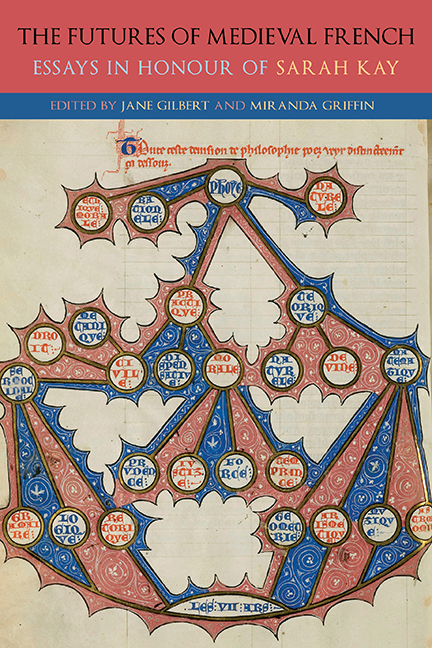Book contents
- Frontmatter
- Dedication
- Contents
- List of Illustrations
- List of Contributors
- List of Abbreviations
- Introduction
- Part I Subjectivity in Troubadour Poetry
- Part II The ‘Chansons de geste’ in the Age of Romance: Political Fictions
- Part III Courtly Contradictions: The Emergence of the Literary Object in the Twelfth Century
- Part IV The Place of Thought: The Complexity of One in French Didactic Literature
- Part V Parrots and Nightingales: Troubadour Quotations and the Development of European Poetry
- Part VI Animal Skins and the Reading Self in Medieval Latin and French Bestiaries
- Afterword
- General Bibliography
- List of Manuscripts
- Bibliography of Work by Sarah Kay
- Index
- Gallica
Introduction
Published online by Cambridge University Press: 27 May 2021
- Frontmatter
- Dedication
- Contents
- List of Illustrations
- List of Contributors
- List of Abbreviations
- Introduction
- Part I Subjectivity in Troubadour Poetry
- Part II The ‘Chansons de geste’ in the Age of Romance: Political Fictions
- Part III Courtly Contradictions: The Emergence of the Literary Object in the Twelfth Century
- Part IV The Place of Thought: The Complexity of One in French Didactic Literature
- Part V Parrots and Nightingales: Troubadour Quotations and the Development of European Poetry
- Part VI Animal Skins and the Reading Self in Medieval Latin and French Bestiaries
- Afterword
- General Bibliography
- List of Manuscripts
- Bibliography of Work by Sarah Kay
- Index
- Gallica
Summary
SARAH KAY's FIRST book was a ground-breaking project to revise and rehabilitate one of the cornerstones of traditional troubadour scholarship in the first half of the twentieth century, what she calls the ‘autobiographical assumption’ (Subjectivity: 2). In this, scholars took it as read that what the ‘I’ of a song's text says reflected the views and experience of the historical author of the poem, and that these were readily accessible to us because, although the grammar and syntax of a lyric might be tricky to untangle, seizing the meaning of poetic language was not identified as a problematic exercise. Then, in the 1970s and 1980s, formalist and intertextual approaches to medieval lyric poetry evacuated the individual from the songs which came to be seen rather as instances of a collective discourse. At the same time, the lyrics’ historical dimension was also subordinated to Marxist-inflected sociological readings: these took the personal element as primarily a figure or synecdoche for a social group, the ‘young men’ (Occitan joven, Latin iuvenes) who, in the view of Erich Köhler (1966), the most influential scholar in this school of criticism, constituted the main focus for the courtly love-song. Against the backdrop of these analyses which privilege structures, Kay's achievement is to return to the texts a full sense of their variety and complexity and to reposition their creators within their own vibrant poetic and socio-cultural context. Drawing on a range of critical thinkers of the latter half of the twentieth century (Derrida, Foucault, Irigaray, Lacan), Subjectivity reintroduces (auto)biography, in the sense of textual self-representation, into intertextuality. It restores depth and vitality to the troubadour canso (courtly love-song) and opens up new ways of thinking about medieval courtly poetry, especially the gender relations and social interactions it expresses. Rereading Subjectivity now, nearly thirty years after its initial appearance, one is struck by how fresh and exciting it still is, how lively the writing, and how rich the insights it continues to offer and inspire.
Kay chooses to concentrate on the cansos, which are concerned with the inner, affective universe of the lover, rather than on troubadour songs with overtly political or satirical themes.
- Type
- Chapter
- Information
- The Futures of Medieval FrenchEssays in Honour of Sarah Kay, pp. 15 - 18Publisher: Boydell & BrewerPrint publication year: 2021

